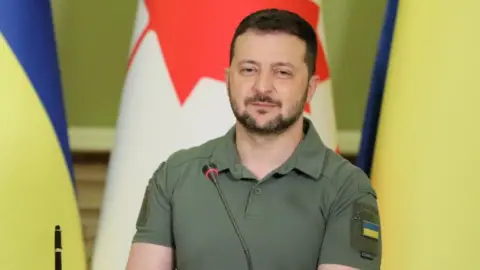Ukraine counter-offensive actions have begun, Zelensky says
 EPA
EPAUkraine's President Volodymyr Zelensky appears to have confirmed that his country's long-awaited counter-offensive against Russia has started.
"Counter-offensive and defensive actions are taking place," he said.
But he added that he would not talk in detail about which stage or state the counter-offensive was in.
The comments come after an escalation of fighting in the south and east of Ukraine and speculation about progress of the widely anticipated push.
Ukrainian troops are reported to have advanced in the east near Bakhmut and in the south near Zaporizhzhia, and have carried out long-range strikes on Russian targets.
But assessing the reality on the front lines is difficult, with the two warring sides presenting contrasting narratives: Ukraine claiming progress and Russia that it is fighting off attacks.
Meanwhile in Russia's Kaluga region - which borders the southern districts around Moscow - governor Vladislav Shapsha said on Telegram that a drone crashed near the village of Strelkovk early on Sunday. The BBC has not independently verified the report.
Russian President Vladimir Putin said in a video interview published Friday that Ukrainian forces had certainly begun their offensive but that attempted advances had failed with heavy casualties.
Speaking in Kyiv on Saturday after talks with Canadian PM Justin Trudeau, Mr Zelensky described the Russian leader's words as "interesting".
Shrugging his shoulders, raising his eyebrows and pretending not to know who Mr Putin was, Mr Zelensky said it was important that Russia felt "they do not have long left".
He also said that Ukraine's military commanders were in a positive mood, adding: "Tell that to Putin."
Mr Trudeau announced 500 million Canadian dollars (£297m) in new military aid for Ukraine during the unannounced visit.
A joint statement issued after the talks said Canada supports Ukraine becoming a Nato member "as soon as conditions allow for it", adding that the issue would be discussed at the Nato Summit in Vilnius, Lithuania, in July.
Meanwhile, fighting has escalated in recent days in the key southern Zaporizhzhia region, Russian officials say. Ukrainian forces are thought to be trying to push south to split Russian forces in two, breaking through the occupied territory which connects Russia to Crimea.
Ukraine's hope of advances in the region could be hindered by huge flooding in the south of the country after the Nova Khakovka dam was destroyed last week.
The flooding has covered around 230 square miles (596 sq km) either side of the Dnipro River.
In his nightly address on Saturday, Mr Zelensky said 3,000 people have been evacuated from the flooded Kherson and Mykolaiv regions.
And Kherson's regional head Oleksandr Prokudin said water levels had dropped by 27cm, but more than 30 settlements on the right bank of the river - which is Ukrainian-held territory - were still flooded and almost 4,000 residential buildings remained underwater.
Nato and Ukraine's military have accused Russia of blowing up the dam, while Russia has blamed Ukraine.
However, it seems highly likely that Russian forces, which controlled the dam, decided to blow it up in order to make it more difficult for Ukrainian forces to cross the river as part of their ongoing counteroffensive, the BBC's Paul Adams says.
